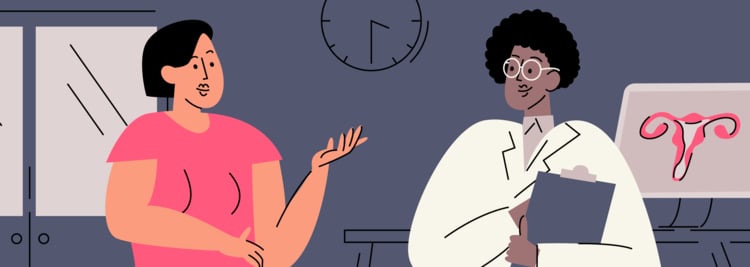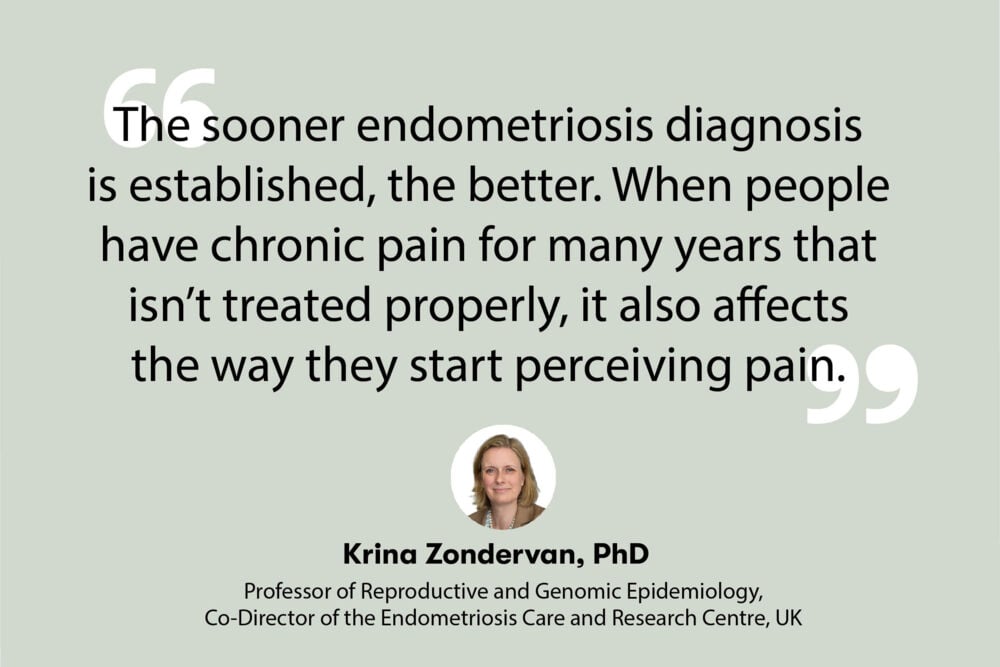If not treated, endometriosis can lead to severe complications — that’s why it’s important not to ignore the symptoms. We asked Krina Zondervan, a professor of reproductive and genomic epidemiology, to tell us when it’s time to seek treatment and how long it takes to recover.
-
Tracking cycle
-
Getting pregnant
-
Pregnancy
-
Help Center
-
Flo for Partners
-
Anonymous Mode
-
Flo app reviews
-
Flo Premium New
-
Secret Chats New
-
Symptom Checker New
-
Your cycle
-
Health 360°
-
Getting pregnant
-
Pregnancy
-
Being a mom
-
LGBTQ+
-
Quizzes
-
Ovulation calculator
-
hCG calculator
-
Pregnancy test calculator
-
Menstrual cycle calculator
-
Period calculator
-
Implantation calculator
-
Pregnancy weeks to months calculator
-
Pregnancy due date calculator
-
IVF and FET due date calculator
-
Due date calculator by ultrasound
-
Medical Affairs
-
Science & Research
-
Pass It On Project New
-
Privacy Portal
-
Press Center
-
Flo Accuracy
-
Careers
-
Contact Us
Treatment for Endometriosis: How Long Does It Take and What Is the Success Rate?


Every piece of content at Flo Health adheres to the highest editorial standards for language, style, and medical accuracy. To learn what we do to deliver the best health and lifestyle insights to you, check out our content review principles.
Interview has been edited for clarity.
When’s it time to see the doctor?
Dr. Zondervan says that experiencing endometriosis-related pain for a long time can also impact your work and your family, so seeking treatment is likely to be the best thing to do to try and break that cycle of pain.
She says that how long it takes to get treatment and how effective it is depends on many factors. First of all, how quickly you get treatment is likely to be both country- and region-specific, so it’s always worth checking whether you have a local center that specializes in endometriosis.
“The problem often is — I can speak for the UK, but this is the same in many other countries — that the waiting list is long for surgery. It’s worth checking that and seeing if there are different clinics out there to choose from,” says Dr. Zondervan.
How long does it take to treat endometriosis?
According to Dr. Zondervan, it depends on your situation, who adds, “In terms of treatment, the initial treatment is usually seeing how symptoms improve with hormones, for example.”
She says that treatment usually happens at the level of the local family practitioner — your general practitioner or primary care provider. “I think it’s important if you feel that treatment isn’t working for you after a number of months to go back quickly and to say, “OK, can you refer me to someone who might be a specialist in this area?”
Dr. Zondervan says that going back to your doctor and being very clear by saying something like, “I’m continuing to have these symptoms, and what you’ve given me, unfortunately, does not work” is really important. “I think it’s common to worry too much about making that statement,” Dr. Zondervan explains.

Take a quiz
Find out what you can do with our Health Assistant
Dr. Zondervan says laparoscopy, although it is under general anesthesia, is an operation that many people recover from in just a matter of days. “It is not comparable to, for example, a large abdominal operation. So although you shouldn’t necessarily take a laparoscopy lightly, it is a really standard approach to try and see what is going on.”
According to Dr. Zondervan, the sooner a diagnosis is established, the better. When people have chronic pain for many many years that isn’t treated properly, it not only affects their lives — it also affects the way they start perceiving pain.
She says there is a lot of research and evidence out there currently that once you have any type of chronic pain, your body and central nervous system start reacting differently to pain perception. So it then becomes much more likely that you will have a lower pain threshold that makes you more prone to experience pain more excessively.
There are a lot of people with pelvic pain who also experience headaches and other types of pain, Dr. Zondervan says. And the evidence is that it’s probably because your central nervous system is starting to become sensitized. So the sooner you try to break that cycle, the better it is for long-term outcomes. Early diagnosis is important for preventing a lot of problems later on.
On a final note
Dr. Zondervan suggests that you don’t hesitate to make an appointment with your health care provider if you suspect you have endometriosis. Endometriosis isn’t something to quietly put up with, and Dr. Zondervan encourages everyone to take the first step towards getting better by speaking to your health care provider as soon as possible.


Hey, I'm Anique
I started using Flo app to track my period and ovulation because we wanted to have a baby.


The Flo app helped me learn about my body and spot ovulation signs during our conception journey.


I vividly
remember the day
that we switched
Flo into
Pregnancy Mode — it was
such a special
moment.
Real stories, real results
Learn how the Flo app became an amazing cheerleader for us on our conception journey.




